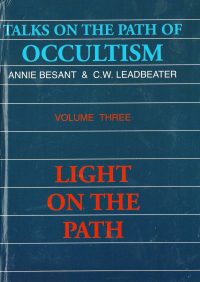Talks on the Path of Occultism – Vol III: Light on the Path
By Annie Besant (1847 - 1933) and Charles Webster Leadbeater (1854 - 1934).
474 Pages | First edition, 10th reprint 2010 | Hardcover | Theosophical Publishing House, Adyar
This book is the third volume of a trilogy, being commentaries on three classics - At the Feet of the Master, The Voice of Silence and Light on the Path - considered the mystical gems of theosophical literature. They throw light on the deep significance and far-reaching implications of the perennial teachings embodied in these three classics, whose subject matter is the path of inner transformation and spiritual realization.
" Once having passed through the storm and attained the peace, it is then always possible to learn, even though the disciple waver, hesitate, and turn aside. The Voice of Silence, remains within him, and though he leave the Path utterly, yet one day it will resound, and rend him asunder and separate his passions from his divine possibilities. Then, with pain and desperate cries from the deserted lower self, he will return... " - From Chapter 'Rule 21', page 285.
 Bezig met bijwerken...
Bezig met bijwerken...